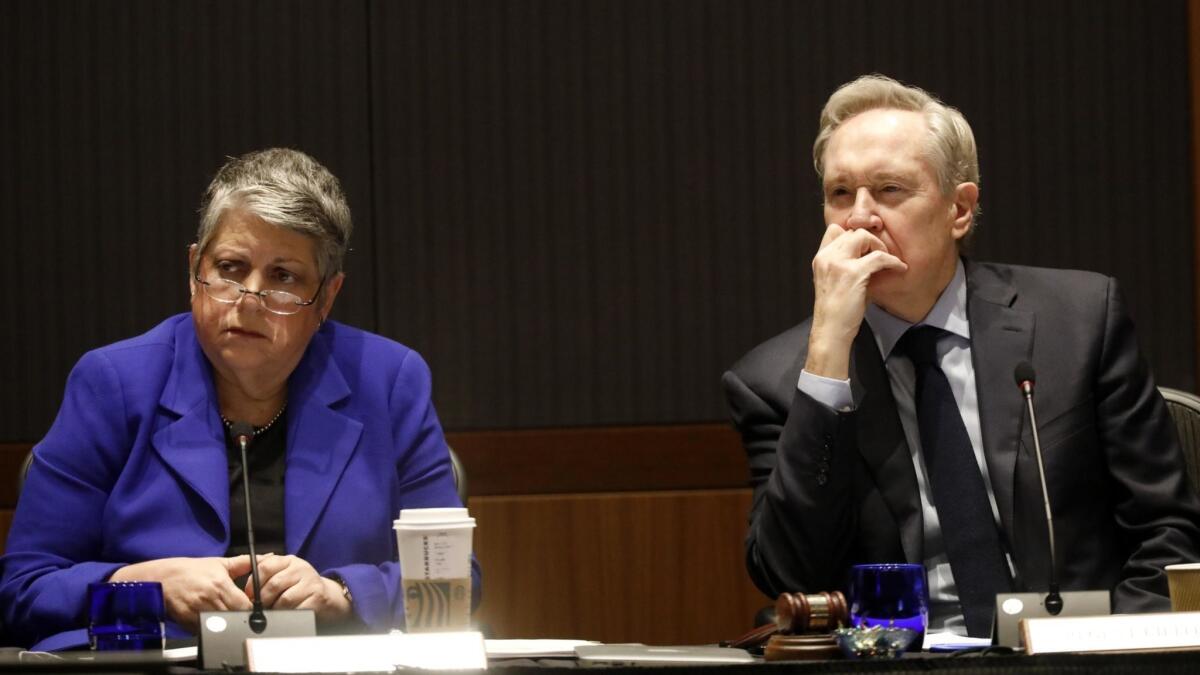UC regents agree to raise tuition for students who live outside California

The UC Regents on Thursday approved a $762 tuition increase for students who live outside of California, with an amendment to set aside some of that money for financial aid.
The 12-1-6 vote on the 2.6% increase had been tabled since March after students and some regents said they were concerned about how it would affect low- and middle-income nonresident students, as well as students who don’t meet the qualifications to receive in-state financial aid.
The amendment was put forth as an olive branch. It will ensure that 10% of the money from the tuition increase will cover financial aid for 10% of nonresident students — roughly the same percentage who rely on student loans to cover at least some of their UC education costs.
The increase is the fifth in a row for nonresident students. Last year, their tuition jumped 3.5%, from $28,014 to $28,992. Now, tuition will rise to $29,754 — on top of the base UC tuition of $12,570.
“As we all recognize, our needs are great,” UC President Janet Napolitano said at Thursday’s Board of Regents meeting. “Without this, we add another $30-million hole and that will have an impact on the education programs we can provide.”
Napolitano has said that the increase will add $26 million to the UC’s budget, which will allow the system to enroll more Californians, increase financial aid, and hire more faculty, staff and teaching assistants. UC spending per student has dropped since 2000 because state funding has not risen to fully cover the tens of thousands of additional students enrolled since then.
To make ends meet, campuses initially turned to recruiting higher-paying out-of-state and international students. But the growing number of nonresidents sparked a political backlash. Legislators ordered a state audit — which contended that UC officials had harmed California students by enrolling so many from out of state — and then directed UC officials to eliminate financial aid for nonresident students and place a cap on their numbers.
During the public comment portion of Thursday’s meeting, several students called the tuition hike “shameful” and “embarrassing.” Many criticized the regents for using nonresident students as an avenue to solve its budget problems.
“I am tired of the UC system milking me for funding that I do not have to fix their broken funding mechanism,” one student said.
Some students predicted the increase will make the population of nonresident students more wealthy and less diverse, as well as make it harder for students who lack immigration status and don’t qualify for in-state tuition to earn a college degree. Others noted that foreign currencies have been devalued, doubling the cost of education for students from countries such as Mexico, Brazil and Europe.
Such is the case for Ashraf Beshay, a UCLA student from Egypt who said that an economic collapse in his country had increased the cost of his UC education from $50,000 to $120,000.
“My journey to this moment has been riddled with pain and hardships,” Beshay said. “My parents’ income now would not have allowed me to afford an education here anymore. If you increase our tuition, you would be perpetuating a passively unapologetic and unsustainable discourse around UC financing.”
The additional financial aid — which both Devon Graves, the student regent, and Hayley Weddle, the student regent-designate, also called insufficient — will be enough to cover the tuition increase for 10% of nonresident students, according to the regents. It’s a slightly higher percentage than those who took student loans in the 2017-18 academic year.
According to UC, applications from domestic nonresident and international students have remained high despite tuition increases every year since 2015. Graduation rates also have improved over time.
Regent Lark Park said she was grateful for the amendment for financial aid, but didn’t feel that it was quite enough.
“As we increase tuition, people of lower means don’t see it as accessible,” she said. “I don’t like the trend line of the data.”
Regent Michael Cohen suggested adding a second amendment that would make the tuition hike contingent upon the passage of Assembly Bill 1620, which would allow more students who lack immigration status to become eligible for financial aid. it was voted down 9 to 11.
“More revenue has to come from somewhere,” UCLA Chancellor Gene Block said Thursday, adding that he and other chancellors have worked to save families thousands of dollars by speeding up the time it takes to graduate. “Of course, it’s expensive, but it has impact on all of our students. There really is a need for these resources to keep the institutions excellent.”
Times staff writer Teresa Watanabe contributed to this report.
alejandra.reyesvelarde@latimes.com
Twitter: @r_valejandra
More to Read
Sign up for Essential California
The most important California stories and recommendations in your inbox every morning.
You may occasionally receive promotional content from the Los Angeles Times.











